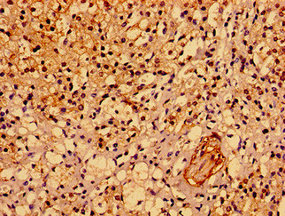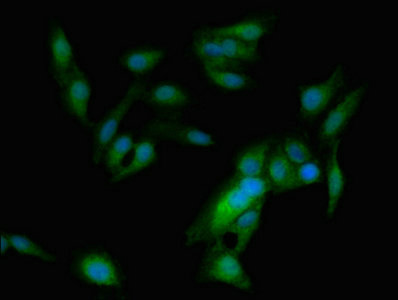ASPM Antibody
-
货号:CSB-PA814245LA01HU
-
规格:¥440
-
促销:
-
图片:
-
Immunohistochemistry of paraffin-embedded human adrenal gland tissue using CSB-PA814245LA01HU at dilution of 1:100
-
Immunohistochemistry of paraffin-embedded human lung tissue using CSB-PA814245LA01HU at dilution of 1:100
-
Immunofluorescent analysis of Hela cells using CSB-PA814245LA01HU at dilution of 1:100 and Alexa Fluor 488-congugated AffiniPure Goat Anti-Rabbit IgG(H+L)
-
-
其他:
产品详情
-
产品名称:Rabbit anti-Homo sapiens (Human) ASPM Polyclonal antibody
-
Uniprot No.:Q8IZT6
-
基因名:ASPM
-
别名:ASPM antibody; MCPH5 antibody; Abnormal spindle-like microcephaly-associated protein antibody; Abnormal spindle protein homolog antibody; Asp homolog antibody
-
宿主:Rabbit
-
反应种属:Human
-
免疫原:Recombinant Human Abnormal spindle-like microcephaly-associated protein (101-234AA)
-
免疫原种属:Homo sapiens (Human)
-
标记方式:Non-conjugated
本页面中的产品,ASPM Antibody (CSB-PA814245LA01HU),的标记方式是Non-conjugated。对于ASPM Antibody,我们还提供其他标记。见下表:
-
克隆类型:Polyclonal
-
抗体亚型:IgG
-
纯化方式:>95%, Protein G purified
-
浓度:It differs from different batches. Please contact us to confirm it.
-
保存缓冲液:Preservative: 0.03% Proclin 300
Constituents: 50% Glycerol, 0.01M PBS, pH 7.4 -
产品提供形式:Liquid
-
应用范围:ELISA, IHC, IF
-
推荐稀释比:
Application Recommended Dilution IHC 1:20-1:200 IF 1:50-1:200 -
Protocols:
-
储存条件:Upon receipt, store at -20°C or -80°C. Avoid repeated freeze.
-
货期:Basically, we can dispatch the products out in 1-3 working days after receiving your orders. Delivery time maybe differs from different purchasing way or location, please kindly consult your local distributors for specific delivery time.
相关产品
靶点详情
-
功能:Involved in mitotic spindle regulation and coordination of mitotic processes. The function in regulating microtubule dynamics at spindle poles including spindle orientation, astral microtubule density and poleward microtubule flux seems to depend on the association with the katanin complex formed by KATNA1 and KATNB1. Enhances the microtubule lattice severing activity of KATNA1 by recruiting the katanin complex to microtubules. Can block microtubule minus-end growth and reversely this function can be enhanced by the katanin complex. May have a preferential role in regulating neurogenesis.
-
基因功能参考文献:
- The c.7543C>T (p.Arg2515Ter) mutation in ASPM is a novel pathogenic mutation for the typical MCPH phenotype in this family PMID: 29431480
- ASPM protein is a spindle pole-focusing factor that functions redundantly with CDK5RAP2. PMID: 28883092
- Whole exome sequencing in one family revealed a novel 1-bp deletion NM_018136.4: c.10013delA (p.Asp3338Valfs*2), while the other family showed a previously reported nonsense mutation NM_018136.4: c.9730C>T (rs199422195 (p.Arg3244*)) in ASPM gene. The novel frame-shift mutation (p.Asp3338Valfs*2) in ASPM presumably truncates the protein synthesis that results in loss of armadillo-type fold domain. PMID: 28674240
- Using homozygosity mapping complemented with whole-exome, gene panel or Sanger sequencing, we identified 12 novel mutations in 3 known MCPH-associated genes - 9 in ASPM, 2 in MCPH1 and 1 in CDK5RAP2. The 2 MCPH1 mutations were homozygous microdeletions of 164,250 and 577,594 bp, respectively, for which we were able to map the exact breakpoints PMID: 28004384
- Abnormal cortical development in primary microcephaly was recapitulated with organoid culture in vitro using patient's induced pluripotent stem cells with ASPM mutation. PMID: 29058117
- Our study enlarges the collection of mutation data in ASPM-related microcephaly and offers new insight into the types and frequencies of the ASPM mutations. Further, our data highlight the clinical and imaging variability in patients with the same causative mutation, suggesting the involvement of additional (epigenetic) factors besides the primary locus. PMID: 27250695
- ASPM-katanin complex controls microtubule disassembly at spindle poles and that misregulation of this process can lead to microcephaly. PMID: 28436967
- in this study we have provided evidence that ASPM controls spindle orientation by regulating the dynamics of astral MT and that CITK is a critical downstream partner of ASPM for this activity. PMID: 27562601
- Through co-expression analysis, ASPM was identified and validated in association with the progression of Hepatitis C virus cirrhosis probably by regulating tumor-related phosphorylation. PMID: 27876500
- The results confirm that mutations in ASPM or WDR62 are the major cause of autosomal recessive primary microcephaly in the Pakistani population. PMID: 27784895
- In the Title. PMID: 27571986
- A novel homozygous splice-site variant in the ASPM gene was identified. The variant is predicted to have an effect on splicing. Human Splice Finder, an in silico tool, predicted skipping of exon 16 due to this variant. Skipping of exon 16 may change the order and number of IQ motifs in the ASPM protein leading to typical autosomal recessive primary microcephaly phenotype. PMID: 27920410
- contrary to current opinion, the cortical volume and surface area of patients with ASPM mutations is reduced depending on a regionally specific fashion and their cognitive profile reflects this heterogeneity. PMID: 26691732
- Suberoylanilide hydroxamic acid enhanced the expression of malignant genes such as ASPM in lung cancer cells remaining after treatment, creating a more drug-resistant state. PMID: 25796627
- Gene-level tests showed that DRD2 was associated with vocabulary, ASPM with vocabulary and reading decoding, and AVPR1A with all three endophenotypes. PMID: 24849541
- ASPM mutations in primary autosomal recessive microcephaly patients in ethnically diverse patients PMID: 23611254
- microcephalin and ASPM expression are deregulated in epithelial ovarian cancer progression PMID: 24830737
- ASPM promotes aggressiveness of pancreatic ductal adenocarcinoma (PDAC) by maintaining Wnt-beta-catenin signaling and stem cell features of PDAC cells. PMID: 23896173
- Autosomal recessive inheritance due to consanguinity caused microcephaly with attention deficit disorder and mental retardation. PMID: 23887221
- Identification of a novel ASPM mutation in a family with primary microcephaly. PMID: 22989186
- Data indicate frameshift and stop mutation leading to truncations (c.3796G > T, p.E1266X and c.7815_7816del, p.E2605fs) in the ASPM gene unexpectedly found on chromosome 1 in apparent X-linked microcephalic intellectual deficit patients. PMID: 22823409
- the association between the recently derived allele of ASPM is likely to be specific and is tied to higher level brain functions in the temporal cortex related to human communication. PMID: 22529908
- Results show for the first time that ASPM is required for efficient non-homologous end-joining in mammalian cells. PMID: 21923303
- We conclude that the common variations we measured in the 4 microcephaly genes, ASPM, MCPH1, CDK5RAP2, and CENPJ, do not affect the risk of Alzheimer disease PMID: 21297427
- Study links Angelman syndrome protein UBE3A to ASPM, centrosome and mitosis. PMID: 21633703
- ASPM interacts with Angelman syndrome protein UBE3A PMID: 21633703
- All medulloblastoma samples overexpressed ASPM gene more than 40-fold PMID: 20694558
- ASPM splice site mutation results in the expression of a novel variant protein lacking a tripeptide motif, a minimal alteration that correlates with a dramatic decrease in ASPM spindle pole localisation. PMID: 21044324
- identified mutations that extended the body of evidence implicating the ASPM gene in the pathogenesis of human hereditary primary microcephaly. PMID: 19808985
- Observational study of gene-disease association. (HuGE Navigator) PMID: 20508983
- Observational study of gene-disease association. (HuGE Navigator) PMID: 20080800
- Similar to aspm of Drosophila. Regulates brain size by regulating mitotic spindle activity in neuronal progenitor cells. PMID: 12355089
- microcephalin and ASPM determine the size of the human brain PMID: 12571366
- identification of all 19 mutations in a cohort of 23 consanguineous families with autosomal recessive primary microcephaly PMID: 14574646
- evolutionary selection of specific segments of the ASPM sequence strongly relates to differences in cerebral cortical size PMID: 15045028
- ASPM mutations is associated with microcephaly PMID: 15355437
- ASPM is localized in the spindle poles during mitosis. This finding suggests that MCPH is the consequence of an impairment in mitotic spindle regulation in cortical progenitors due to mutations in ASPM. PMID: 15972725
- ASPM may be involved in mitotic spindle function, possibly, through regulation of BRCA1 PMID: 16123590
- We thus expand the clinical spectrum of ASPM mutations by showing that they can occur in patients with seizures and that the history of seizures alone should not necessarily preclude the diagnosis of primary microcephaly. PMID: 16141009
- findings show that one genetic variant of ASPM in humans arose merely about 5800 years ago and has since swept to high frequency under strong positive selection PMID: 16151010
- The study found no evidence that the selected alleles of MCPH1 and ASPM were associated with increases or decreases in brain volume. PMID: 16687438
- ASPM inhibition by siRNA-mediated knockdown inhibits tumor cell proliferation and neural stem cell proliferation, supporting ASPM as a potential molecular target in glioblastoma PMID: 17090670
- Studies using 2393 subjects do not support a detectable association between the recent adaptive evolution of either ASPM or Microcephalin and changes in IQ. PMID: 17220170
- no relationship was found between polymorphisms of brain regulator gene ASPM and any general mental ability, head circumference and social intelligence PMID: 17251122
- A GFP-tagged fragment of the N-terminus of ASPM localizes to centrosomes and spindle poles, while a GFP-tagged fragment of the C-terminus localizes to midbodies. PMID: 17534152
- that phenotypes other than brain size may have been selected for in ASPM and MCPH1 variants during evolution of modern humans. PMID: 17566767
- The latest ASPM variant arising about 6000 years ago somewhere in the Middle East may be connected with alphabetical writing. PMID: 17604569
- four novel sequence variants (Y1712X, I1717X, Y3353X, R3244X) were detected and all were predicted to be protein truncating. PMID: 17849285
- This is the first report suggesting that the suppression of Aspm by IR could be the initial molecular target leading to the future microcephaly formation. PMID: 18331833
- the neuronal depletion associated with the ASPM defect predominantly affects the anterior cortex PMID: 18452193
显示更多
收起更多
-
相关疾病:Microcephaly 5, primary, autosomal recessive (MCPH5)
-
亚细胞定位:Cytoplasm. Cytoplasm, cytoskeleton, spindle. Nucleus.
-
数据库链接:
HGNC: 19048
OMIM: 605481
KEGG: hsa:259266
STRING: 9606.ENSP00000356379
UniGene: Hs.121028
Most popular with customers
-
-
YWHAB Recombinant Monoclonal Antibody
Applications: ELISA, WB, IF, FC
Species Reactivity: Human, Mouse, Rat
-
Phospho-YAP1 (S127) Recombinant Monoclonal Antibody
Applications: ELISA, WB, IHC
Species Reactivity: Human
-
-
-
-
-
























